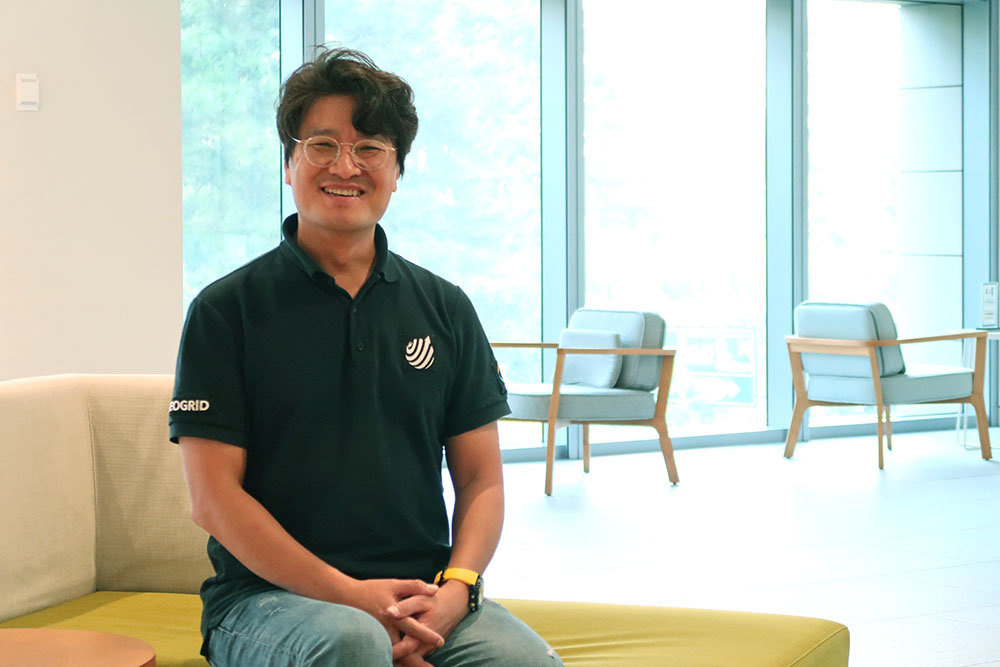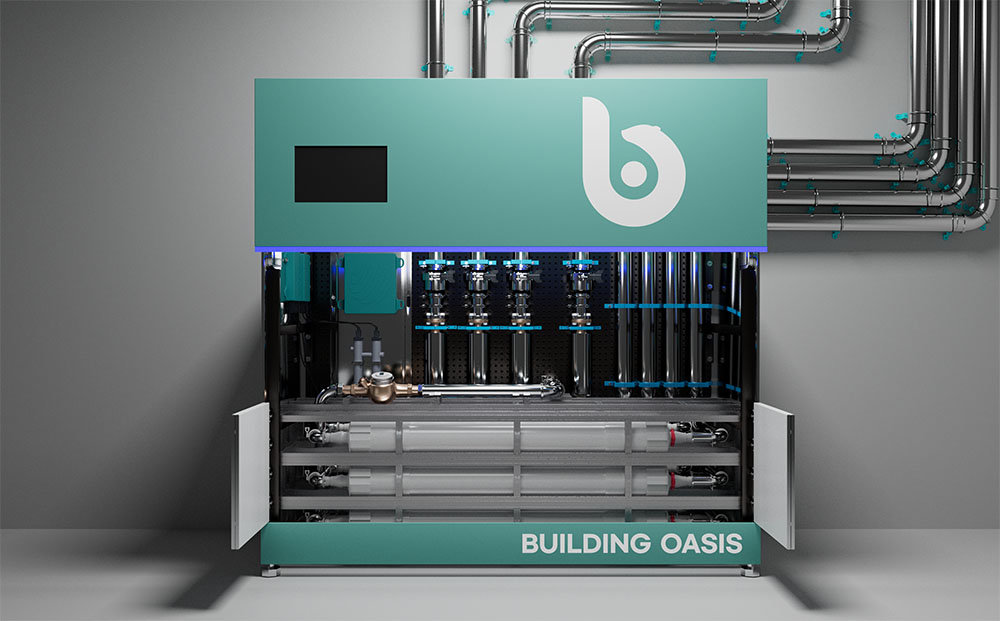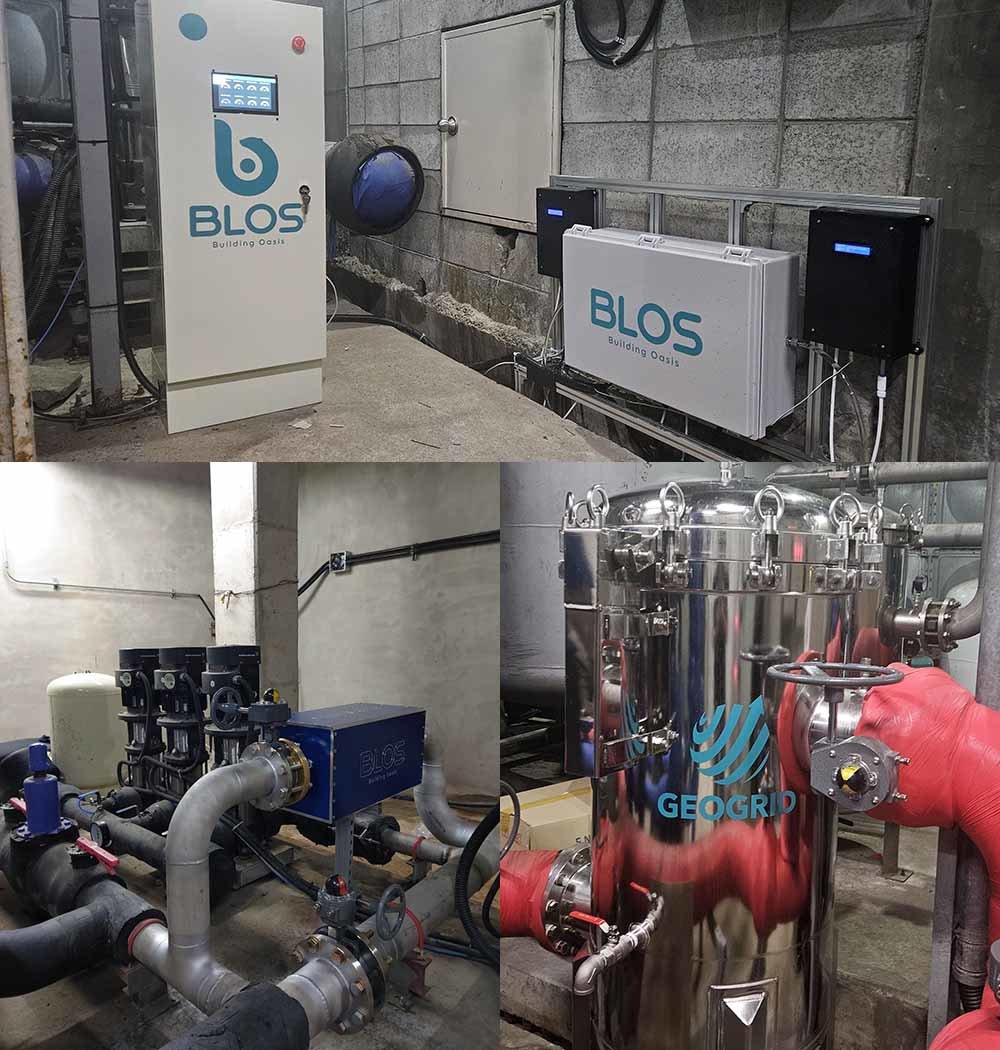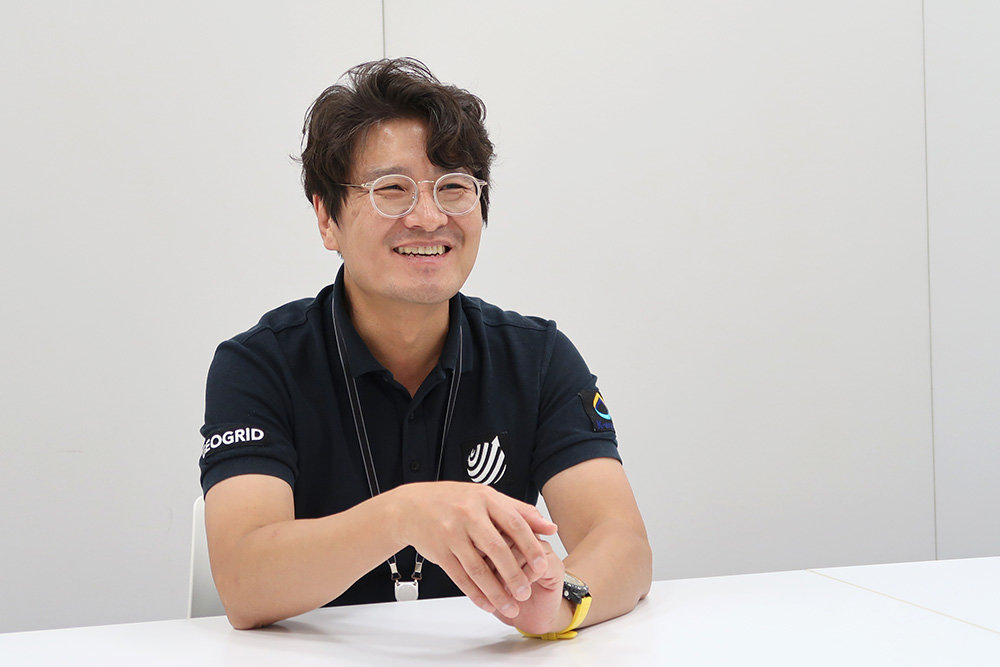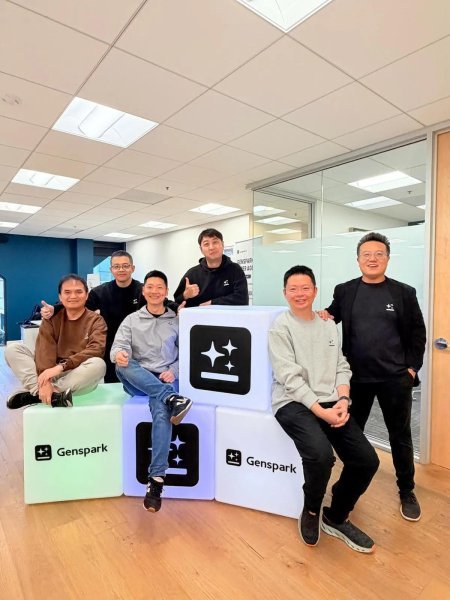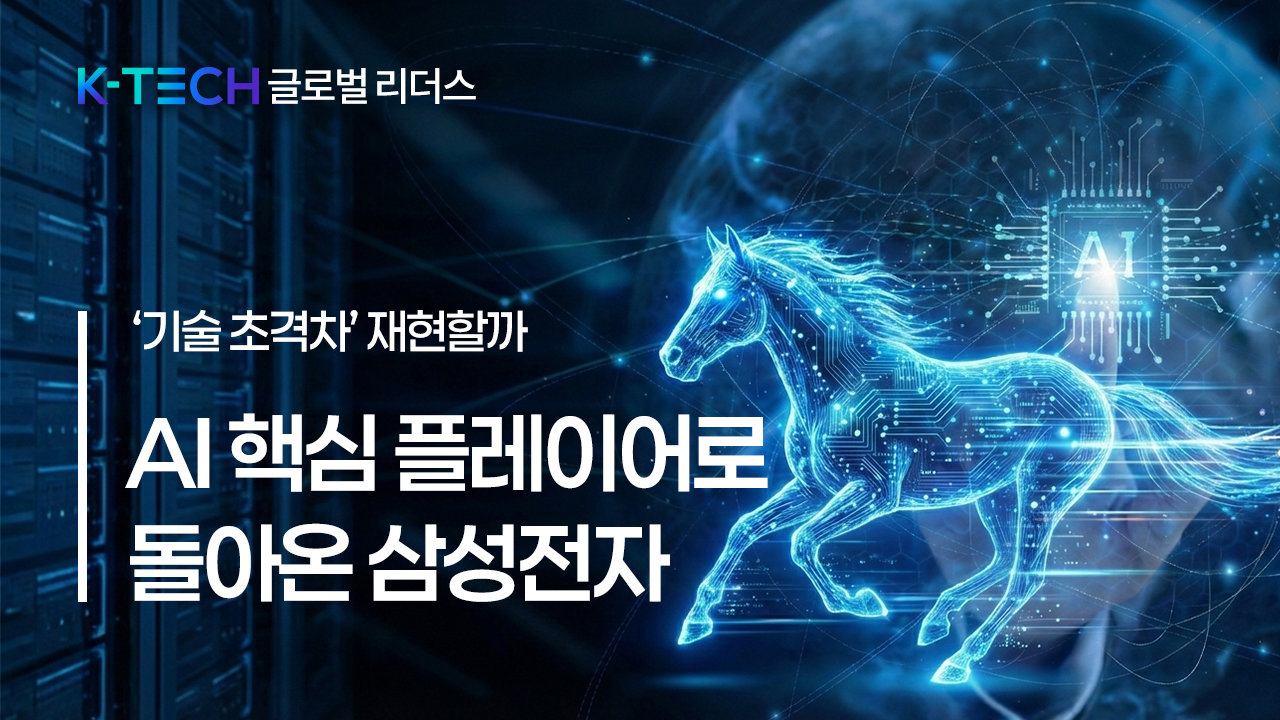
Startup / Tech
Geogrid Launches Building Water Purifier, Blos
Dong-A Ilbo |
Updated 2025.10.24
[SBA x IT Donga Joint Planning] The Seoul Metropolitan Government and the Seoul Business Agency (SBA) have established startup hubs (centers) in Chang-dong, Seongsu, and Dongjak, Seoul. They support and nurture startups through stage-specific programs from initial startup to growth phases. Promising startups with high growth potential that have shown outstanding activities by 2025 are introduced.
[IT Donga Reporter Han Man-hyuk] Geogrid has developed the smart water quality management and purification system 'BLOS'. BLOS consists of ▲ a water quality improvement system composed of filtration, sterilization, and ionization processes ▲ a monitoring system to confirm improved water quality ▲ a data analysis system, and it purifies the water entering a building and sends it to all faucets within the building. Geogrid introduces BLOS as a 'building purifier'.
BLOS was first launched in April 2023 and has been applied to resorts, apartments, schools, etc., receiving positive responses from both building managers and water users. Geogrid plans to expand its market focusing on schools and accommodation facilities and to officially enter overseas markets starting with Southeast Asia and Japan.
Met with Kim Ki-hyun, CEO of Geogrid, who expressed a desire to help places around the world suffering from water quality issues, to discuss Geogrid and BLOS.
From Travel Industry to Water-related Business
IT Donga: Hello, CEO Kim Ki-hyun. Please introduce yourself.
CEO Kim Ki-hyun: Hello, I am Kim Ki-hyun, operating Geogrid. I have worked in the travel industry for about 20 years. I worked as a travel guide, developed related apps, and published books. I also ran a travel agency for about 10 years. However, the COVID-19 pandemic caused the collapse of what I had built in an instant. So, I contemplated other business ideas and discovered business opportunities in the water-related market, leading to the founding of Geogrid in November 2020.
IT Donga: The water-related business is a completely different field from your previous career. Why did you choose this field as a business item?
CEO Kim Ki-hyun: The travel industry is greatly affected by external issues. It suffers the most and first from pandemics like COVID-19, MERS, and swine flu, as well as natural disasters, conflicts, and economic issues. This was the most challenging part of working in the travel industry. Therefore, I considered a business item that is not influenced by external environments.
Then I saw a frozen water meter box made by my father and became interested in the water-related field. Upon investigation, I found that digitalization was slower compared to other fields and judged it was worth challenging. Although I had no experience in the water-related field, approaching it with a new perspective allowed me to see many opportunities.
IT Donga: It seems it wasn't easy at the beginning of the business.
CEO Kim Ki-hyun: Since it was my first time in the water field and as a startup, there were many difficulties. Especially at the time of founding, the capital was the minimum amount for establishing a corporation, KRW 1 million. It was financially challenging due to COVID-19. Therefore, I actively applied for government support projects to raise funds for technology development. Despite many trials and errors, I ultimately secured the necessary funds for development and completed the required development in about three years.
IT Donga: Please introduce Geogrid. What kind of company is it?
CEO Kim Ki-hyun: Geogrid is a proptech company. Many think of us as a water tech company, but since our technology enhances the value of real estate, we introduce ourselves as a proptech company. The company name was chosen to signify accurately measuring energy-related data in the ground, such as electricity, water, and gas.
We are currently developing and operating the smart water quality management and purification system BLOS. Initially, we developed a smart water grid system that stably supplies electricity to remote water metering services. This system was selected as an innovative product and a public procurement win-win cooperation product. However, due to additional construction costs incurred during system replacement and the strong network of existing market participants, we faced difficulties entering the market.
Eventually, we decided to change our business item and developed the smart water quality management and purification system BLOS, which integrates water quality data metering, tap water usage metering, and a water quality improvement system.
Water Quality Improvement, Monitoring, and Analysis, BLOS
IT Donga: Please introduce BLOS.
CEO Kim Ki-hyun: BLOS is a system that purifies the water entering a building and sends it to all faucets within the building. In short, it is a 'building purifier'. For reference, BLOS stands for Building Oasis.
BLOS consists of a water quality improvement system that purifies water, a monitoring system that checks the water quality status, and a data analysis system that analyzes the measured data.
The water quality improvement system is divided into three main stages. First, contaminants are filtered out through a filter. Then, it goes through a sterilization device, which eliminates bacteria that the filter cannot remove. The filter and sterilization devices are combined according to the building environment and water quality. This purifies the water entering the building to the level of water from a waterworks office.
Finally, it undergoes an ionization process. The internal pipes of a building generate contaminants such as rust over time as they oxidize. Even clean water becomes contaminated after passing through these pipes. When the water is ionized, the oxygen in the water is removed, preventing pipe oxidation. This allows the pipes to remain clean over time. Additionally, if the pipes are already rusted, the ionized water causes the rust to adhere to the walls, forming an oxide film. Since contaminants do not mix with the water, the water remains clean even after passing through the pipes.
The monitoring system measures the water quality status through sensors. We install sensors at three points: before passing through the water quality improvement system, immediately after passing through, and at the end of the pipe farthest from the system. By comparing and analyzing the measurements at each point, we assess the water's condition, the effectiveness of water quality improvement, and the quality of water that has passed through the pipes. The monitoring system also informs when to replace the filters.
The data analysis system analyzes the building's internal pipe condition, the possibility of red water inflow, and the potential occurrence of bacteria and heavy metals based on the data measured by the monitoring system.
IT Donga: What are the advantages of BLOS compared to existing systems?
CEO Kim Ki-hyun: Previously, companies supporting functions such as pipe management through water ionization, filter installation, and water quality monitoring existed individually. We provide these functions in an integrated manner. Upgrading existing technologies such as ionization devices and monitoring systems is also an advantage of BLOS. Recently, we developed a filter capable of filtering perfluoroalkyl substances (PFAS) with the U.S. market in mind.
Increasing Domestic and International Adoption, High Customer Satisfaction
IT Donga: When was BLOS launched? Where has it been applied?
CEO Kim Ki-hyun: BLOS was first launched in April 2023. Since then, we have been increasing adoption cases while enhancing the system. It has been applied to Forest Resom and Restree Resom Resorts, a 50-year-old apartment, and mineral springs. Recently, it has been installed in numerous schools in Seoul, Gyeonggi, and Gangwon, and we are conducting a proof of concept (PoC) for groundwater facilities at Samsung Digital City.
Customer satisfaction is quite high. In particular, the turbidity of water in the 50-year-old apartment was more than 12 times the standard value, but it was reduced to within the normal range after installing BLOS. Both managers and residents were satisfied. Water quality managers of buildings such as schools responded that they felt reassured about the water quality after installing BLOS. In the case of resorts, it is quite positive in preventing customer complaints related to water quality in advance.
IT Donga: Please tell us about overseas adoption cases.
CEO Kim Ki-hyun: In December last year, we installed it in an old apartment in Jakarta, Indonesia. We participated in an overseas exhibition with support from the Korea Environmental Industry & Technology Institute and the Korea Trade-Investment Promotion Agency (KOTRA), and signed a contract on the spot. This led to inquiries from shopping malls in Indonesia. We have completed local inspections and are about to sign a contract. We are also preparing for a PoC in Japan. With support from SBA, we held meetings with Japanese construction companies, and we plan to conduct a PoC by early next year at the latest.
Having confirmed the demand in the global market, we plan to actively conduct sales activities in Southeast Asia, including Indonesia, Malaysia, and Bangladesh, next year.
IT Donga: You are currently receiving support from SBA. What kind of support have you received?
CEO Kim Ki-hyun: We received support for office space at the Seoul Startup Hub Seongsu and opportunities for global market entry and investment attraction in places like Silicon Valley and Japan. We also received help in market expansion by installing BLOS at Kyunghee Girls' Middle and High School in Dongdaemun-gu through a demonstration project. Thanks to the extensive support and assistance from SBA, we were able to grow significantly.
IT Donga: Lastly, please tell us about your future plans and goals.
CEO Kim Ki-hyun: I believe it is now time to actively promote BLOS and strive to secure sales. Therefore, we plan to actively conduct sales activities for market expansion. In the domestic market, we have set schools and accommodation facilities as our first targets. We believe that schools will be easy to expand the market because BLOS can prevent unfortunate accidents caused by tap water on campus. For accommodation facilities, we plan to accelerate sales in the related field based on the adoption case at Resom Resort and the ongoing discussions with large hotels.
Our sales were KRW 100 million in 2023 when BLOS was first launched, and KRW 200 million the following year. We expect to achieve KRW 2 billion in sales this year. We anticipate that the sales scale will increase significantly if we secure references through various PoCs conducted this year and actively conduct sales activities while promoting overseas market entry next year.
Along with this, we plan to continue technology development. We are currently developing a system called 'Water BEMS (Building Energy Management System)' to manage water energy with a large corporation. Existing BEMS is limited to electrical energy, but Water BEMS is expected to improve building unit water energy management efficiency by measuring all information affecting water usage and quality.
The water-related market in Korea has grown in the order of water purifiers, plastic bottled water, and shower filters. It started with drinking and expanded to the skin. I believe the next stage is 'lifestyle purification'. It involves purifying all the water used in our lives, such as cleaning, laundry, cooking, and dishwashing. I anticipate that lifestyle purification will become common by 2029, about five years from now, and I will develop the business in preparation for that time. Additionally, the slow digitalization of the water industry is a problem not only in Korea but worldwide. Through BLOS, we aim to widely disseminate Korea's water-related technology globally. We want to grow into a company that can help many places suffering from water quality issues.
IT Donga Reporter Han Man-hyuk (mh@itdonga.com)
[IT Donga Reporter Han Man-hyuk] Geogrid has developed the smart water quality management and purification system 'BLOS'. BLOS consists of ▲ a water quality improvement system composed of filtration, sterilization, and ionization processes ▲ a monitoring system to confirm improved water quality ▲ a data analysis system, and it purifies the water entering a building and sends it to all faucets within the building. Geogrid introduces BLOS as a 'building purifier'.
BLOS was first launched in April 2023 and has been applied to resorts, apartments, schools, etc., receiving positive responses from both building managers and water users. Geogrid plans to expand its market focusing on schools and accommodation facilities and to officially enter overseas markets starting with Southeast Asia and Japan.
Met with Kim Ki-hyun, CEO of Geogrid, who expressed a desire to help places around the world suffering from water quality issues, to discuss Geogrid and BLOS.
Kim Ki-hyun, CEO of Geogrid / Source=IT Donga
From Travel Industry to Water-related Business
IT Donga: Hello, CEO Kim Ki-hyun. Please introduce yourself.
CEO Kim Ki-hyun: Hello, I am Kim Ki-hyun, operating Geogrid. I have worked in the travel industry for about 20 years. I worked as a travel guide, developed related apps, and published books. I also ran a travel agency for about 10 years. However, the COVID-19 pandemic caused the collapse of what I had built in an instant. So, I contemplated other business ideas and discovered business opportunities in the water-related market, leading to the founding of Geogrid in November 2020.
IT Donga: The water-related business is a completely different field from your previous career. Why did you choose this field as a business item?
CEO Kim Ki-hyun: The travel industry is greatly affected by external issues. It suffers the most and first from pandemics like COVID-19, MERS, and swine flu, as well as natural disasters, conflicts, and economic issues. This was the most challenging part of working in the travel industry. Therefore, I considered a business item that is not influenced by external environments.
Then I saw a frozen water meter box made by my father and became interested in the water-related field. Upon investigation, I found that digitalization was slower compared to other fields and judged it was worth challenging. Although I had no experience in the water-related field, approaching it with a new perspective allowed me to see many opportunities.
IT Donga: It seems it wasn't easy at the beginning of the business.
CEO Kim Ki-hyun: Since it was my first time in the water field and as a startup, there were many difficulties. Especially at the time of founding, the capital was the minimum amount for establishing a corporation, KRW 1 million. It was financially challenging due to COVID-19. Therefore, I actively applied for government support projects to raise funds for technology development. Despite many trials and errors, I ultimately secured the necessary funds for development and completed the required development in about three years.
IT Donga: Please introduce Geogrid. What kind of company is it?
CEO Kim Ki-hyun: Geogrid is a proptech company. Many think of us as a water tech company, but since our technology enhances the value of real estate, we introduce ourselves as a proptech company. The company name was chosen to signify accurately measuring energy-related data in the ground, such as electricity, water, and gas.
We are currently developing and operating the smart water quality management and purification system BLOS. Initially, we developed a smart water grid system that stably supplies electricity to remote water metering services. This system was selected as an innovative product and a public procurement win-win cooperation product. However, due to additional construction costs incurred during system replacement and the strong network of existing market participants, we faced difficulties entering the market.
Eventually, we decided to change our business item and developed the smart water quality management and purification system BLOS, which integrates water quality data metering, tap water usage metering, and a water quality improvement system.
Water Quality Management and Purification System BLOS / Source=Geogrid
Water Quality Improvement, Monitoring, and Analysis, BLOS
IT Donga: Please introduce BLOS.
CEO Kim Ki-hyun: BLOS is a system that purifies the water entering a building and sends it to all faucets within the building. In short, it is a 'building purifier'. For reference, BLOS stands for Building Oasis.
BLOS consists of a water quality improvement system that purifies water, a monitoring system that checks the water quality status, and a data analysis system that analyzes the measured data.
The water quality improvement system is divided into three main stages. First, contaminants are filtered out through a filter. Then, it goes through a sterilization device, which eliminates bacteria that the filter cannot remove. The filter and sterilization devices are combined according to the building environment and water quality. This purifies the water entering the building to the level of water from a waterworks office.
Finally, it undergoes an ionization process. The internal pipes of a building generate contaminants such as rust over time as they oxidize. Even clean water becomes contaminated after passing through these pipes. When the water is ionized, the oxygen in the water is removed, preventing pipe oxidation. This allows the pipes to remain clean over time. Additionally, if the pipes are already rusted, the ionized water causes the rust to adhere to the walls, forming an oxide film. Since contaminants do not mix with the water, the water remains clean even after passing through the pipes.
The monitoring system measures the water quality status through sensors. We install sensors at three points: before passing through the water quality improvement system, immediately after passing through, and at the end of the pipe farthest from the system. By comparing and analyzing the measurements at each point, we assess the water's condition, the effectiveness of water quality improvement, and the quality of water that has passed through the pipes. The monitoring system also informs when to replace the filters.
The data analysis system analyzes the building's internal pipe condition, the possibility of red water inflow, and the potential occurrence of bacteria and heavy metals based on the data measured by the monitoring system.
IT Donga: What are the advantages of BLOS compared to existing systems?
CEO Kim Ki-hyun: Previously, companies supporting functions such as pipe management through water ionization, filter installation, and water quality monitoring existed individually. We provide these functions in an integrated manner. Upgrading existing technologies such as ionization devices and monitoring systems is also an advantage of BLOS. Recently, we developed a filter capable of filtering perfluoroalkyl substances (PFAS) with the U.S. market in mind.
BLOS installed at Resom Resort / Source=Geogrid
Increasing Domestic and International Adoption, High Customer Satisfaction
IT Donga: When was BLOS launched? Where has it been applied?
CEO Kim Ki-hyun: BLOS was first launched in April 2023. Since then, we have been increasing adoption cases while enhancing the system. It has been applied to Forest Resom and Restree Resom Resorts, a 50-year-old apartment, and mineral springs. Recently, it has been installed in numerous schools in Seoul, Gyeonggi, and Gangwon, and we are conducting a proof of concept (PoC) for groundwater facilities at Samsung Digital City.
Customer satisfaction is quite high. In particular, the turbidity of water in the 50-year-old apartment was more than 12 times the standard value, but it was reduced to within the normal range after installing BLOS. Both managers and residents were satisfied. Water quality managers of buildings such as schools responded that they felt reassured about the water quality after installing BLOS. In the case of resorts, it is quite positive in preventing customer complaints related to water quality in advance.
IT Donga: Please tell us about overseas adoption cases.
CEO Kim Ki-hyun: In December last year, we installed it in an old apartment in Jakarta, Indonesia. We participated in an overseas exhibition with support from the Korea Environmental Industry & Technology Institute and the Korea Trade-Investment Promotion Agency (KOTRA), and signed a contract on the spot. This led to inquiries from shopping malls in Indonesia. We have completed local inspections and are about to sign a contract. We are also preparing for a PoC in Japan. With support from SBA, we held meetings with Japanese construction companies, and we plan to conduct a PoC by early next year at the latest.
Having confirmed the demand in the global market, we plan to actively conduct sales activities in Southeast Asia, including Indonesia, Malaysia, and Bangladesh, next year.
IT Donga: You are currently receiving support from SBA. What kind of support have you received?
CEO Kim Ki-hyun: We received support for office space at the Seoul Startup Hub Seongsu and opportunities for global market entry and investment attraction in places like Silicon Valley and Japan. We also received help in market expansion by installing BLOS at Kyunghee Girls' Middle and High School in Dongdaemun-gu through a demonstration project. Thanks to the extensive support and assistance from SBA, we were able to grow significantly.
CEO Kim Ki-hyun explaining BLOS / Source=IT Donga
IT Donga: Lastly, please tell us about your future plans and goals.
CEO Kim Ki-hyun: I believe it is now time to actively promote BLOS and strive to secure sales. Therefore, we plan to actively conduct sales activities for market expansion. In the domestic market, we have set schools and accommodation facilities as our first targets. We believe that schools will be easy to expand the market because BLOS can prevent unfortunate accidents caused by tap water on campus. For accommodation facilities, we plan to accelerate sales in the related field based on the adoption case at Resom Resort and the ongoing discussions with large hotels.
Our sales were KRW 100 million in 2023 when BLOS was first launched, and KRW 200 million the following year. We expect to achieve KRW 2 billion in sales this year. We anticipate that the sales scale will increase significantly if we secure references through various PoCs conducted this year and actively conduct sales activities while promoting overseas market entry next year.
Along with this, we plan to continue technology development. We are currently developing a system called 'Water BEMS (Building Energy Management System)' to manage water energy with a large corporation. Existing BEMS is limited to electrical energy, but Water BEMS is expected to improve building unit water energy management efficiency by measuring all information affecting water usage and quality.
The water-related market in Korea has grown in the order of water purifiers, plastic bottled water, and shower filters. It started with drinking and expanded to the skin. I believe the next stage is 'lifestyle purification'. It involves purifying all the water used in our lives, such as cleaning, laundry, cooking, and dishwashing. I anticipate that lifestyle purification will become common by 2029, about five years from now, and I will develop the business in preparation for that time. Additionally, the slow digitalization of the water industry is a problem not only in Korea but worldwide. Through BLOS, we aim to widely disseminate Korea's water-related technology globally. We want to grow into a company that can help many places suffering from water quality issues.
IT Donga Reporter Han Man-hyuk (mh@itdonga.com)
AI-translated with ChatGPT. Provided as is; original Korean text prevails.
ⓒ dongA.com. All rights reserved. Reproduction, redistribution, or use for AI training prohibited.
Popular News







